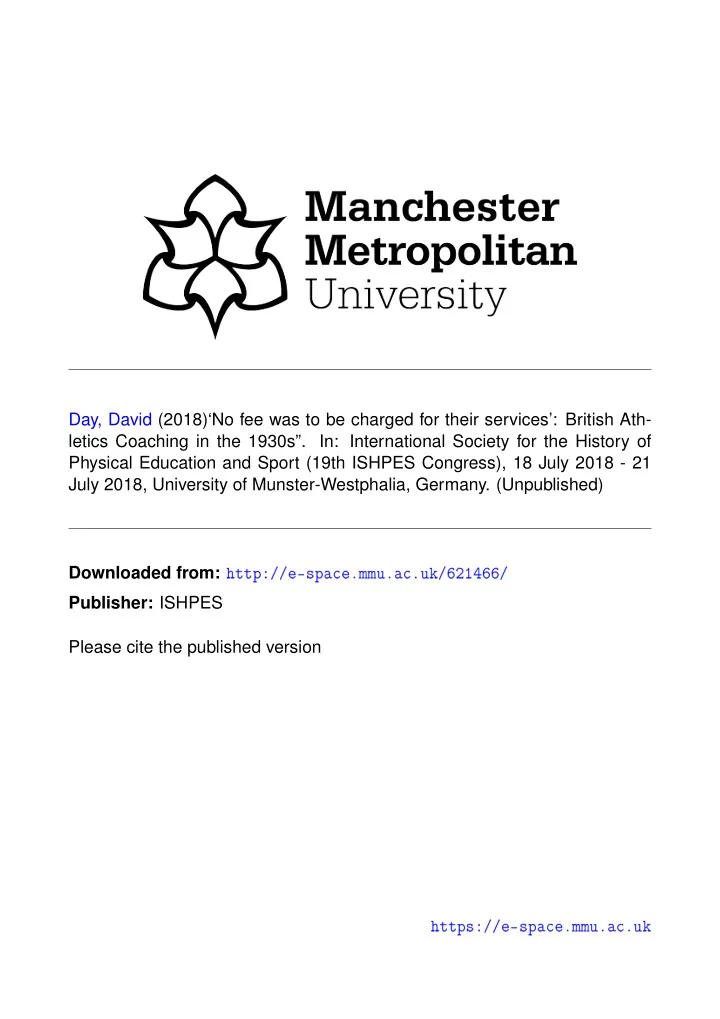

Day, David (2018)‘No fee was to be charged for their services’: British Ath- letics Coaching in the 1930s”. In: International Society for the History of Physical Education and Sport (19th ISHPES Congress), 18 July 2018 - 21 July 2018, University of Munster-Westphalia, Germany. (Unpublished) Downloaded from: ❤tt♣✿✴✴❡✲s♣❛❝❡✳♠♠✉✳❛❝✳✉❦✴✻✷✶✹✻✻✴ Publisher: ISHPES Please cite the published version ❤tt♣s✿✴✴❡✲s♣❛❝❡✳♠♠✉✳❛❝✳✉❦
1 ‘No fee was to be charged for their services’: British Athletics Coaching in the 1930s For fuller coverage of this topic see: Day, D. (2018). Bricoleurs Extraordinaire: Sports Coaches in Inter War Britain. Sports Coaching Review. 10.1080/21640629.2018.1521624 Harold Perkin described inter-war British society as being in a ‘transitional stage, a sort of halfway house in which remnants of Victorianism…co-existed with harbingers of the future’ and this applied to all aspects of social, political and economic life, including sport, where class dynamics continued to exert an influence. Since the inception of the BOC in 1905 all six of its presidents and ten of its thirteen chairpersons held aristocratic titles and this elitism was reflected by the large proportion of university men, including twelve Oxbridge blues, who comprised the track and field team at Stockholm in 1912. This led one critic to observe that ‘Caste rules the world of athletes and all is snobbery...At present the whole tendency seems to be that only public school and university men shall have all the chances.’ Little changed in the post war period and continuities between the old and the new are examined here through the lens of sports coaching. This paper draws on biographical sources, contemporary accounts and texts to explore the ongoing influence of amateurism through a brief analysis of a group of volunteer athletics coaches and argues that amateurism left a legacy that continued to influence mid to late twentieth-century athletics. Concerns about increasing American influence engendered numerous cultural critiques in the inter-war period. Hollywood films, fashions in clothing, drinking, dance and popular music had a major impact on British society, although a vociferous minority condemned them as vulgar, commercialised, and mass-produced. Elite athletes, however, often regarded the US as ‘the exemplar of modernity, technology, and progress’ and respected the nation’s dominance in international sport, achieved through ‘rigorous and extensive training’. Every American college, university or club, had expert professional coaches whose livelihood depended upon competitive success, resulting in the adoption of a highly systematic coach-centred model, emphasizing excellence and winning, even in the schools. During the interwar years, this American coaching model was rejected in Britain where amateurism remained the dominant influence. A late- Victorian public school educated elite had used sport and the ethos of amateurism, with its emphasis on fair play, participation and socialising with peers rather than on victory, to distinguish itself from other middle-class groups. An important corollary was the principle of voluntarism, which resulted in the rationalisation of sport being undertaken by those with time, income, and social influence. Their antagonism towards commercialised sport encompassed an antipathy to professional coaches. Amateurs preferred to view sporting performance as the product of natural talent rather than systematic training and they employed definitions of an amateur as one who had never ‘taught any athletic exercise as a means of pecuniary gain’ to exclude professional pedagogues. As other countries began to take sport more seriously in the inter-war period, the international failures of British athletes became increasingly common. British discourses suggested that even if foreign competitors were more successful, the British approach remained superior. If a British athlete lost, this was because he/she was more ‘sporting’, less ‘professional’, thus giving Britain the moral high ground. Much of the rhetoric continued to juxtapose British and American coaching provision. One commentator decried the American system as ‘the mass production of athletes’ and argued that American coaches were ‘apt to crush individuality – to refuse genius the right to its efficacious eccentricities’. In 1933, Lyon said, ‘Let us hope that the British coach will remain the exact antithesis of the American football coach. The latter says: ‘Win somehow! I don’t mind how but win you must!’ The former says: ‘Well, I hope we shall win and I know you'll do your utmost. But, by heaven, we'd rather lose than win by doing something unsporting. After all it's only a game.’ ‘Honorary’ Coaches Before the war, A.B. George had argued that only amateur coaches had any original ideas about training and that they had been responsible for any innovations in competitive sport. He later noted that the recruitment of national representatives and Oxbridge Blues as coaches was critical since their experience inevitably made them ‘qualified to instruct and coach’; although many professional coaches believed that amateur coaching was often worse than useless. These issues remained unresolved well into the interwar years, even though professional coaches continued to operate successfully, such as Cambridge University coach Alec Nelson, Oxford University coach Bill Thomas, and Harry Andrews,
Recommend
More recommend